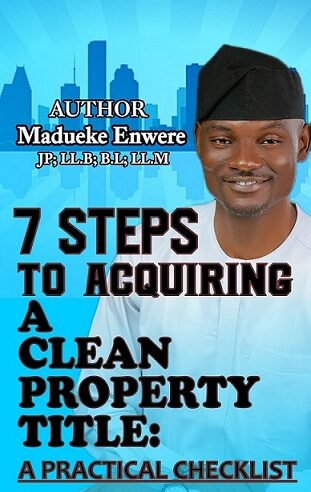INTRODUCTION: THE MYTH OF ABSOLUTE TESTAMENTARY FREEDOM
When people write a will, they often assume it is their final word — a document no one can question. Many say, “It’s my property, I can give it to whoever I want.” But in Nigeria, that is not entirely true.
Watch the full video on YouTube:
The law recognizes what is called testamentary freedom — the right to decide who inherits your assets when you pass away. However, this freedom is not absolute. Both the law and cultural traditions impose important limitations. This means that even after carefully drafting a will, the courts can cancel or alter certain provisions, especially if they affect your spouse, children, dependents, or involve properties restricted by customary law.
Now imagine buying a property derived from a will which will is later declared void or invalid. Suddenly, your “dream property” becomes a legal nightmare.
LEGAL LIMITATIONS: PROTECTION FOR SPOUSES AND DEPENDENTS
The law is clear: you cannot ignore your spouse or dependents in your will.
If a husband writes a will and completely excludes his wife, the courts can amend that will to provide for her.
If a wife ignores her spouse, dependent children or aged parents in her will, the courts can intervene and ensure they are not left destitute.
This is because the law frowns at irresponsibility. Death should not be an excuse to abandon those who relied on you while you were alive.
For example, the parents of late Herbert Nwigwe challenged his will because they were financially dependent on him before his untimely death in a helicopter crash. They have rights to reasonable provisions, even though the will did not provide for that. That formed a valid ground to challenge the will.
CUSTOMARY LIMITATIONS: THE POWER OF TRADITION
Beyond legal rules, customary law also restricts what you can do with certain properties.
Take Igboland as an example:
The ancestral homestead, called “Alaobi” cannot be sold, gifted, or even willed away. It belongs to the lineage and automatically passes to the eldest son in each generation.
The principle is summed up in the saying: “Alaobi Adi Ere, Alaobi Adi Enye” — the family compound land is neither sold nor gifted.
A similar rule exists in Benin, where the “Igiobe” (the family house) must pass to the eldest son, regardless of what the will says.
In the famous Supreme Court case of Idehen v. Idehen, a man tried to will the family house to his younger son because of disagreements with his first son. The court overruled his will and confirmed the customary right of the first son.
In short, custom overrides the will when it comes to ancestral or family property.
PUBLIC POLICY LIMITATIONS: WHAT YOU CAN’T LEGALLY DO
Another important restriction is public policy and legality.
If a property was under government acquisition during your lifetime, you cannot suddenly transfer it through your will. Death does not give you a license to do what was unlawful when you were alive. This means that a will cannot be used to “launder” illegally acquired land.
WHY THIS MATTERS TO PROPERTY BUYERS
Now, here’s where it gets critical:
If you buy land or a house tied to a disputed will, you are walking into danger. The courts may withdraw that property and reallocate it to another person. In that process, you lose both the property and the money you paid.
This is one of the hidden traps in real estate. Buyers assume that because a property is inherited and “documented” in a will, it must be safe. But wills can be contested, amended, or voided.
That is why due diligence is not optional — it is your safety net.
HOW ENCUMBERED PROPERTIES PROTECTS YOU
At Encumbered Properties, our mission is simple: to ensure you never fall victim to these silent but costly mistakes.
Here’s how we help:
- We investigate the history of a property to check if it is tied to a contested or unlawful will.
- We verify customary restrictions that may override the will.
- We scrutinize legal documents to ensure there are no dependents or beneficiaries who can challenge ownership later.
- We provide a practical checklist: 7 Steps and Guide to Acquiring a Clean Property Title.

This manual guides buyers step by step towards dictating and avoiding the legal traps we highlighted above. To order for the book, click the “GET” button above.
With the approach highlighted in this book, you don’t just buy land — you buy peace of mind, security, and confidence.
CONCLUSION: INVEST WISELY, LIVE SAFELY
A will may look final, but the truth is, the law and custom have the last word. If you rely only on a seller’s word or a piece of paper, you may end up paying for someone else’s legal battle.
To stay safe:
- Always investigate the history of the property.
- Verify if it is subject to customary law restrictions.
- Check if the testator has dependents who can contest the will.
Don’t buy blindly. Don’t buy regrets. Don’t buy court cases, but buy, using our checklist: 7 Steps and Guides to Acquiring a Clean Property Title!

Partner with Encumbered Properties and make every property investment a source of security, not sorrow.
Remember: had I known is always avoidable.
THIS ARTICLE WAS WRITTEN BY:
Madueke Enwere
A Real Estate Lawyer, Chief Superintendent of Police and by God’s Grace, The Founder ENCUMBERED PROPERTIES DOT COM (the only real estate frauds prevention platform)
#PropertyLaw #EncumberedProperties #RealEstateNigeria #PropertyInvestment #PropertyScamAlert #CleanTitle

